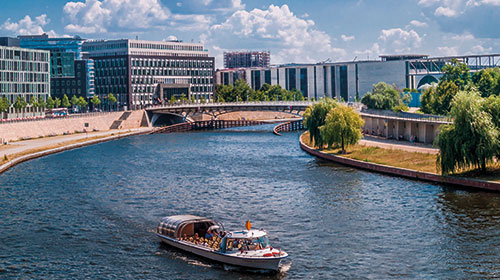Water management in Berlin
Berlin's complex and technically demanding water management ensures excellent drinking water quality and very clean waters.
With its lakes, rivers and canals, Berlin is a city that is rich in water. The special natural conditions make it possible for the metropolis to supply itself with drinking water from its regional resources and also to feed the waste water back into the local water supply after appropriate treatment. Many specialized companies are helping to achieve this feat of sustainable resource management and are constantly developing the necessary technologies.
Several best practice examples are already in use in the city, such as the "offshore" mixed water storage unit in the Spree River, the retention ground filter for rainwater treatment or the many gray water recycling and rainwater harvesting systems in homes and offices.
Facts and figures
- Berlin has a sewage network with 164 pumping stations, about 9,750 km of sewers and more than 1,000 km of penstocks.
- The capital supplies itself with drinking water from regional resources and feeds its wastewater after appropriate treatment into the local water supply.
- Berliner Wasserbetriebe (BWB) is the largest water supply company in Germany and plays an important role in numerous R&D projects.
- The trade fair TAUSENDWASSER is the Berlin industry event with national significance.
- The specialist congress InfraSPREE is the industry summit and network meeting of the water industry and technical infrastructure in Berlin and Brandenburg.
- A large number of innovative medium-sized companies provide a wide range of technologies.
- Berlin offers a multidisciplinary and internationally oriented research landscape.
- Extensive networking and very good cooperation opportunities are available, including with the SME network MARIS Berlin Brandenburg, the Technische Universität Berlin, the Competence Center Water Berlin, Berlin water companies, the Berlin Rainwater Agency, etc.
Interdisciplinary research
Berlin's universities and research institutes are important partners for companies in the water industry. 20 departments from 9 faculties are working at the TU Berlin in the research network "Water in Urban Areas", pooling their different skills for a future-oriented, urban water management.
The Competence Center Water Berlin (KWB) is an internationally unique center for water research and knowledge transfer. It is dedicated to decisive future issues relating to climate change, water crises, digitization, sector coupling and urbanization with dedicated research, practical solutions and innovative services. It networks the research activities of Berlin’s universities and research institutions, the Berlinwasser group of companies, Berlin SMEs and the administration.
The Leibniz-Institute of Freshwater Ecology and Inland Fisheries is the largest German center for ecosystem research on inland waters.
Water management in Berlin
The Berlin water management companies have extensive know-how in the areas of groundwater management, drinking water supply, sewage disposal, surface water and rainwater management as well as in modelling, pump and measurement technology. In recent years, for example, findings from third-party funded projects and experimental spaces have been supplemented by advisory services and transferred to a wide range of services in order to implement the vision of Berlin as a “sponge city”. This helps to prepare the city for extreme weather events better.



